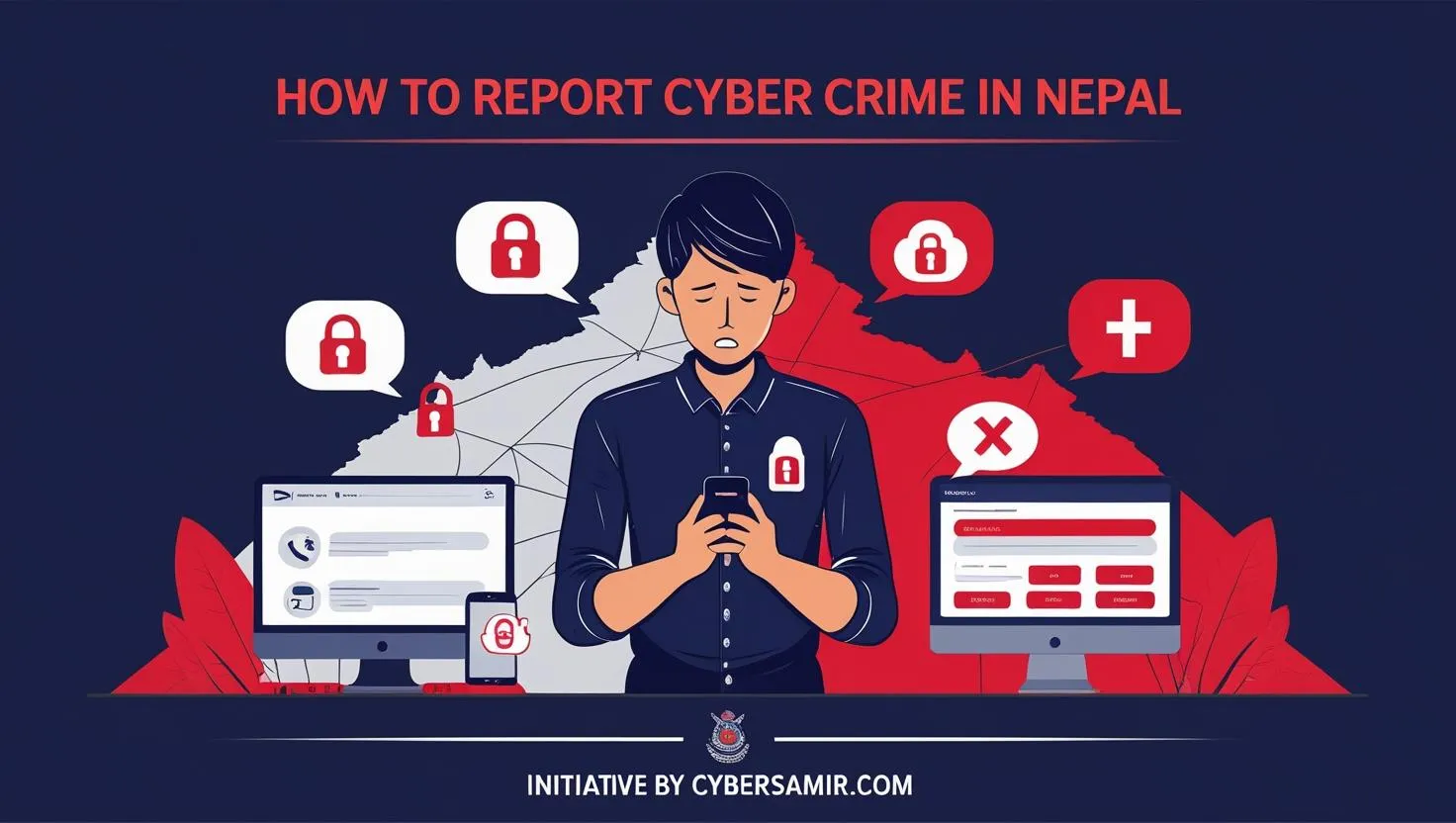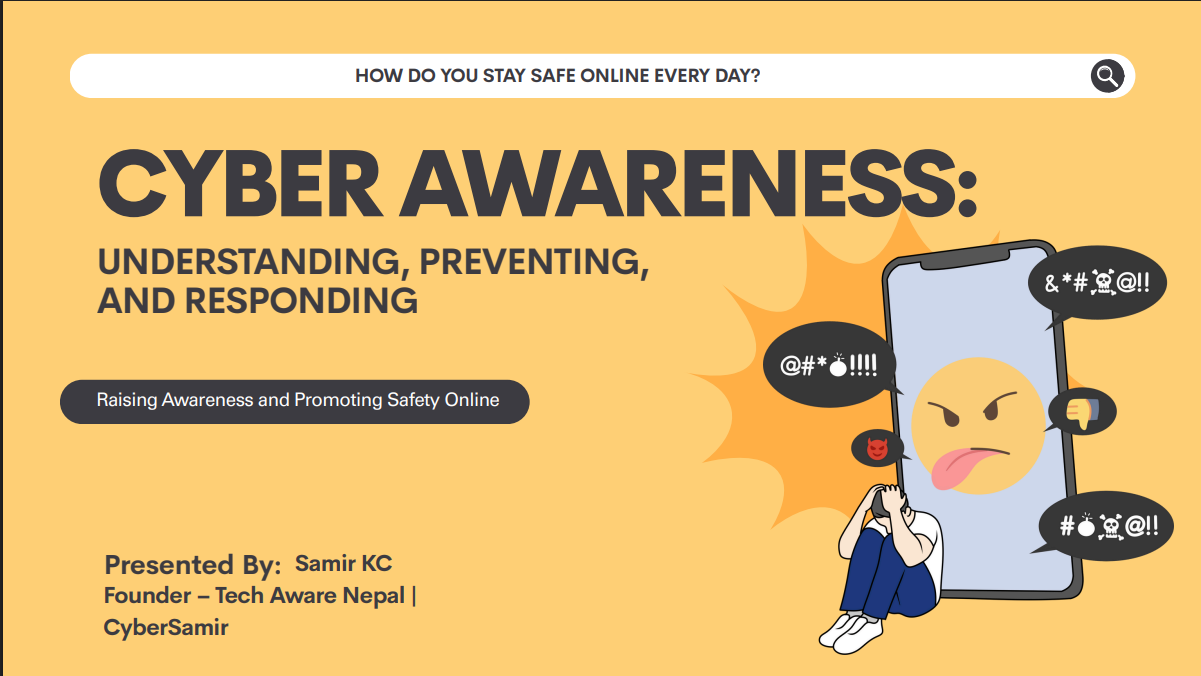
Why Cybersecurity Awareness Should Be Taught in Nepali Schools
Why Cybersecurity Awareness Should Be Taught in Nepali Schools
Equipping Nepal’s Youth for a Safer Digital Future
Introduction
As Nepal embraces digital transformation, with growing internet access and smartphone penetration, the risks of cyber threats are escalating. A 2024 report highlighted $12.4 billion in global losses to AI-driven scams, including deepfakes and fake crypto platforms. In this context, teaching cybersecurity awareness in Nepali schools is critical to prepare students for a digital world fraught with dangers like phishing, sextortion, and ransomware. This article explores why cybersecurity education should be integrated into Nepal’s school curriculum and its potential impact.
The Growing Cyber Threat Landscape in Nepal
Nepal’s internet penetration has reached over 90% in urban areas, with young people increasingly active on social media, online learning platforms, and e-commerce. However, this connectivity comes with risks. Phishing attacks, social engineering, and AI-powered scams target students who often lack the knowledge to identify threats. For instance, sextortion scams, which surged by 137% in 2025 globally, exploit teenagers through fake profiles or stolen data, as reported by Avast. Without cybersecurity education, Nepali students are vulnerable to financial loss, identity theft, and emotional harm.
Why Cybersecurity Education is Essential
Integrating cybersecurity awareness into school curricula equips students with essential skills to navigate the digital world safely. Key reasons include:
- Early Awareness: Teaching cybersecurity from a young age fosters a culture of vigilance, helping students recognize phishing emails, suspicious links, and fake profiles.
- Digital Literacy: Cybersecurity education complements digital literacy, enabling students to use technology responsibly and protect their personal information.
- Preventing Exploitation: Awareness of scams like sextortion and romance fraud can protect students from emotional and financial exploitation.
- Future Workforce: As Nepal’s economy grows in tech and digital sectors, cybersecurity knowledge prepares students for careers in IT and cybersecurity.
Current Gaps in Nepal’s Education System
Nepal’s school curriculum focuses heavily on traditional subjects, with limited emphasis on digital skills. While computer science is offered in some schools, it rarely covers practical cybersecurity topics like password management, safe browsing, or recognizing social engineering. A 2023 survey by Nepal’s Ministry of Education showed that only 15% of secondary schools include basic digital safety in their programs, leaving most students unprepared for cyber threats.
Proposed Curriculum Changes
To address these gaps, Nepal’s education system should integrate cybersecurity awareness into existing subjects or as a standalone module. Suggested topics include:
- Online Safety Basics: Identifying phishing emails, securing social media accounts, and using strong passwords.
- Recognizing Scams: Understanding AI-driven scams, deepfakes, and sextortion tactics.
- Data Protection: Using multi-factor authentication (MFA) and managing personal data.
- Cyber Ethics: Promoting responsible online behavior and respecting privacy.
Interactive methods like workshops, simulations, and gamified learning can make these lessons engaging. Collaborations with organizations like the Nepal Telecommunications Authority or global cybersecurity firms could provide resources and expertise.
Benefits for Students and Society
Cybersecurity education empowers students to protect themselves and their communities. It reduces the risk of falling victim to scams, which cost billions globally, and fosters a safer digital environment. Educated students can also guide their families, spreading awareness in rural areas where digital literacy is low. Moreover, cybersecurity skills open career opportunities in Nepal’s growing IT sector, contributing to economic development.
Challenges and Solutions
Implementing cybersecurity education faces challenges like limited teacher training, lack of resources, and rural-urban disparities. Solutions include:
- Teacher Training: Offer workshops to equip teachers with cybersecurity knowledge.
- Public-Private Partnerships: Collaborate with tech companies to fund resources and develop curricula.
- Localized Content: Create materials in Nepali and local languages to ensure accessibility.
Conclusion
As cyber threats like AI-driven scams and sextortion grow, with $12.4 billion lost globally in 2024, teaching cybersecurity awareness in Nepali schools is no longer optional—it’s a necessity. By equipping students with the skills to navigate the digital world safely, Nepal can build a resilient, tech-savvy generation. Integrating cybersecurity into the curriculum will protect students, strengthen communities, and prepare Nepal for a secure digital future. For more resources, visit FBI or Avast.
साइबरसुरक्षा शिक्षा किन आवश्यक छ
स्कूल पाठ्यक्रममा साइबरसुरक्षा जागरूकता समावेश गर्नाले विद्यार्थीहरूलाई डिजिटल संसारमा सुरक्षित रूपमा नेभिगेट गर्न आवश्यक सीपहरू प्रदान गर्छ। प्रमुख कारणहरू निम्न छन्:
- प्रारम्भिक जागरूकता: सानै उमेरदेखि साइबरसुरक्षा सिकाउनाले सतर्कताको संस्कृति विकास गर्छ, जसले विद्यार्थीहरूलाई फिसिङ इमेल, शंकास्पद लिङ्क, र नक्कली प्रोफाइलहरू पहिचान गर्न मद्दत गर्छ।
- डिजिटल साक्षरता: साइबरसुरक्षा शिक्षाले डिजिटल साक्षरतालाई पूरक बनाउँछ, जसले विद्यार्थीहरूलाई प्रविधिको जिम्मेवार प्रयोग र व्यक्तिगत जानकारी सुरक्षा गर्न सक्षम बनाउँछ।
- शोषण रोकथाम: सेक्सटोर्सन र प्रेम ठगी जस्ता स्कामहरूको जानकारीले विद्यार्थीहरूलाई भावनात्मक र आर्थिक शोषणबाट जोगाउन सक्छ।
- भविष्यको कार्यबल: नेपालको अर्थतन्त्र प्रविधि र डिजिटल क्षेत्रमा बढ्दै जाँदा, साइबरसुरक्षा ज्ञानले विद्यार्थीहरूलाई IT र साइबरसुरक्षाको क्यारियरको लागि तयार पार्छ।
नेपालको शिक्षा प्रणालीमा हालका कमजोरीहरू
नेपालको स्कूल पाठ्यक्रमले परम्परागत विषयहरूमा धेरै जोड दिन्छ, डिजिटल सीपहरूमा सीमित ध्यान दिन्छ। केही स्कूलहरूमा कम्प्यूटर विज्ञान उपलब्ध भए तापनि, यसले पासवर्ड व्यवस्थापन, सुरक्षित ब्राउजिङ, वा सामाजिक इन्जिनियरिङ पहिचान जस्ता व्यावहारिक साइबरसुरक्षा विषयहरू समेट्दैन। नेपालको शिक्षा मन्त्रालयको २०२३ को सर्वेक्षणले देखाएको छ कि केवल १५% माध्यमिक स्कूलहरूले आधारभूत डिजिटल सुरक्षा आफ्ना कार्यक्रमहरूमा समावेश गर्छन्, जसले अधिकांश विद्यार्थीहरूलाई साइबर खतराहरूको लागि अतयार छोड्छ।
प्रस्तावित पाठ्यक्रम परिवर्तनहरू
यी कमजोरीहरूलाई सम्बोधन गर्न, नेपालको शिक्षा प्रणालीले साइबरसुरक्षा जागरूकतालाई विद्यमान विषयहरूमा समावेश गर्नुपर्छ वा यसलाई छुट्टै मोड्युलको रूपमा लागू गर्नुपर्छ। प्रस्तावित विषयहरूमा निम्न समावेश छन्:
- अनलाइन सुरक्षा आधारहरू: फिसिङ इमेलहरू पहिचान गर्ने, सामाजिक मिडिया खाताहरू सुरक्षित गर्ने, र बलियो पासवर्डहरू प्रयोग गर्ने।
- ठगीहरू पहिचान: AI-संचालित ठगीहरू, डीपफेकहरू, र सेक्सटोर्सन रणनीतिहरू बुझ्ने।
- डेटा संरक्षण: मल्टि-फ्याक्टर प्रमाणीकरण (MFA) प्रयोग गर्ने र व्यक्तिगत डेटा व्यवस्थापन गर्ने।
- साइबर नैतिकता: जिम्मेवार अनलाइन व्यवहार र गोपनीयताको सम्मान गर्ने।
वर्कशपहरू, सिमुलेसनहरू, र गेमिफाइड सिकाइ जस्ता अन्तरक्रियात्मक विधिहरूले यी पाठहरूलाई रुचिकर बनाउन सक्छन्। नेपाल टेलिकम्युनिकेसन प्राधिकरण वा विश्वव्यापी साइबरसुरक्षा कम्पनीहरूसँगको सहकार्यले स्रोतहरू र विशेषज्ञता प्रदान गर्न सक्छ।
विद्यार्थी र समाजका लागि लाभहरू
साइबरसुरक्षा शिक्षाले विद्यार्थीहरूलाई आफू र आफ्नो समुदायलाई सुरक्षित राख्न सशक्त बनाउँछ। यसले विश्वव्यापी रूपमा अर्बौं नोक्सानी गर्ने ठगीहरूको जोखिम कम गर्छ र सुरक्षित डिजिटल वातावरणलाई प्रोत्साहन गर्छ। शिक्षित विद्यार्थीहरूले आफ्ना परिवारलाई मार्गदर्शन गर्न सक्छन्, विशेष गरी डिजिटल साक्षरता कम भएको ग्रामीण क्षेत्रहरूमा। साथै, साइबरसुरक्षा सीपहरूले नेपालको बढ्दो IT क्षेत्रमा क्यारियर अवसरहरू खोल्छ, जसले आर्थिक विकासमा योगदान पुर्याउँछ।
चुनौतीहरू र समाधानहरू
साइबरसुरक्षा शिक्षा लागू गर्न शिक्षक प्रशिक्षणको कमी, स्रोतहरूको अभाव, र ग्रामीण-शहरी असमानता जस्ता चुनौतीहरू छन्। समाधानहरूमा निम्न समावेश छन्:
- शिक्षक प्रशिक्षण: शिक्षकहरूलाई साइबरसुरक्षा ज्ञान प्रदान गर्न वर्कशपहरू आयोजना गर्ने।
- सार्वजनिक-निजी साझेदारी: टेक कम्पनीहरूसँग सहकार्य गरी स्रोतहरू र पाठ्यक्रम विकास गर्न।
- स्थानीयकृत सामग्री: नेपाली र स्थानीय भाषाहरूमा सामग्रीहरू सिर्जना गरी पहुँच सुनिश्चित गर्ने।
निष्कर्ष
AI-संचालित ठगी र सेक्सटोर्सन जस्ता साइबर खतराहरू बढ्दै जाँदा, सन् २०२४ मा विश्वव्यापी रूपमा $12.4 बिलियनको नोक्सानी भएको सन्दर्भमा, नेपाली स्कूलहरूमा साइबरसुरक्षा जागरूकता सिकाउनु अनिवार्य भएको छ। विद्यार्थीहरूलाई डिजिटल संसारमा सुरक्षित रूपमा नेभिगेट गर्न सीपहरू प्रदान गरेर, नेपालले लचिलो र प्रविधि-सजग पुस्ता निर्माण गर्न सक्छ। पाठ्यक्रममा साइबरसुरक्षा समावेश गर्नाले विद्यार्थीहरूको सुरक्षा गर्छ, समुदायहरूलाई बलियो बनाउँछ, र नेपाललाई सुरक्षित डिजिटल भविष्यको लागि तयार गर्छ। थप स्रोतहरूको लागि, FBI वा Avast को वेबसाइट भ्रमण गर्नुहोस्।
`; cybereduToggleLangBtn.addEventListener('click', () => { isNepali = !isNepali; if (isNepali) { // Switch to Nepali cybereduHeroTitle.textContent = nepaliTitle; cybereduHeroSubtitle.textContent = nepaliSubtitle; cybereduArticleContent.innerHTML = nepaliContent; cybereduToggleLangBtn.textContent = 'Switch to English'; document.documentElement.lang = 'ne'; document.title = 'नेपाली स्कूलहरूमा साइबरसुरक्षा जागरूकता किन सिकाउनुपर्छ'; } else { // Switch to English cybereduHeroTitle.textContent = englishTitle; cybereduHeroSubtitle.textContent = englishSubtitle; cybereduArticleContent.innerHTML = englishContent; cybereduToggleLangBtn.textContent = 'Switch to Nepali'; document.documentElement.lang = 'en'; document.title = 'Why Cybersecurity Awareness Should Be Taught in Nepali Schools'; } });





